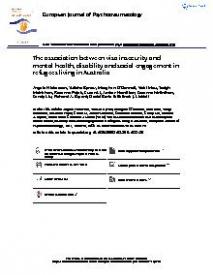The association between visa insecurity and mental health, disability and social engagement in refugees living in Australia
Background: The vast majority of the world’s refugees and people seeking asylum live in a state of sustained displacement. Little is known, however, about the mental health impact of prolonged insecurity.
Objective: This study aimed to investigate the association between insecure visa status and mental health, suicidality, disability and social engagement in a sample of refugees and asylum-seekers living in Australia
Method: Participants were 1,085 refugees with secure (i.e. permanent residency or Australian citizenship, n = 826, 76.1%) and insecure (i.e. asylum-seeker claim, bridging visa, temporary visa, n = 259, 23.9%) visa status who had arrived in Australia since January 2011, and were from Arabic, Farsi, Tamil or English-speaking backgrounds. Participants completed an online survey assessing pre- and post-migration experiences, mental health, disability and social engagement.
Results: Results indicated that, after controlling for background factors, refugees with insecure visas had significantly greater PTSD symptoms, depression symptoms, thoughts of being better off dead and suicidal intent compared to those with secure visas. There were no group differences in disability. Refugees with insecure visas received support from significantly more groups in the Australian community than those with secure visas. Further, refugees with insecure visa status who had low group membership showed greater depression symptoms and suicidal intent than those with secure visa status who had low group membership.
Conclusion: Findings highlight the negative mental health consequences of living in a state of protracted uncertainty for refugees and people seeking asylum, and the key role of social engagement in influencing mental health amongst insecure visa holders. Results also underscore the importance of designing and implementing policies and services that facilitate improved mental health for those with visa insecurity.
Geachte bezoeker,
De informatie die u nu opvraagt, kan door psychotraumanet niet aan u worden getoond. Dit kan verschillende redenen hebben,
waarvan (bescherming van het) auteursrecht de meeste voorkomende is. Wanneer het mogelijk is om u door te verwijzen naar de bron
van deze informatie, dan ziet u hier onder een link naar die plek.
Als er geen link staat, kunt u contact opnemen met de bibliotheek,
die u verder op weg kan helpen.
Met vriendelijke groet,
Het psychotraumanet-team.
In: European Journal of Psychotraumatology, ISSN 2000-8066 | 10 | 1
https://www.tandfonline.com/doi/full/10.1080/20008198.2019.1688129
online verschenen 15/12/2019


